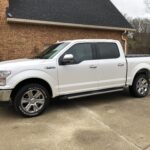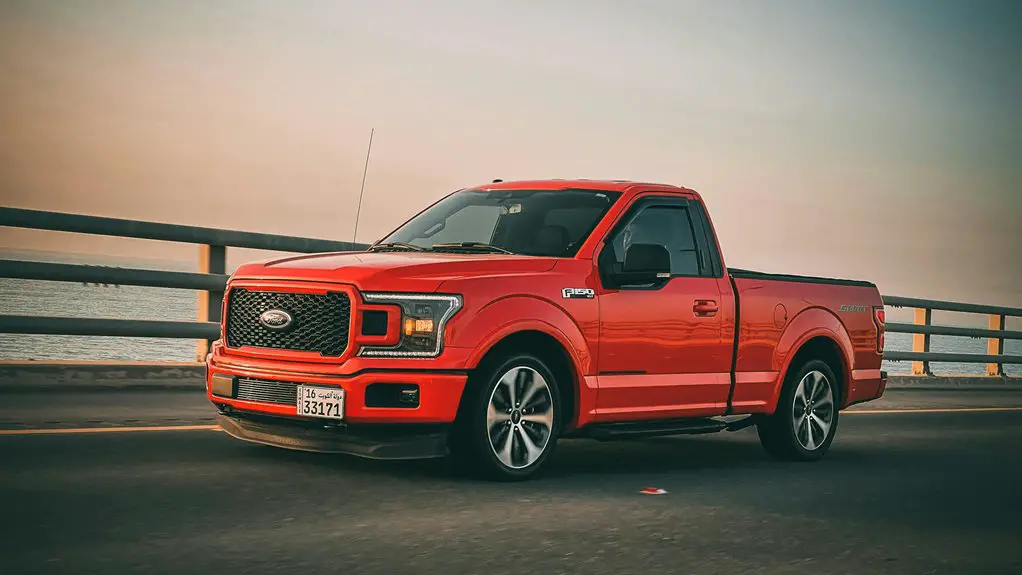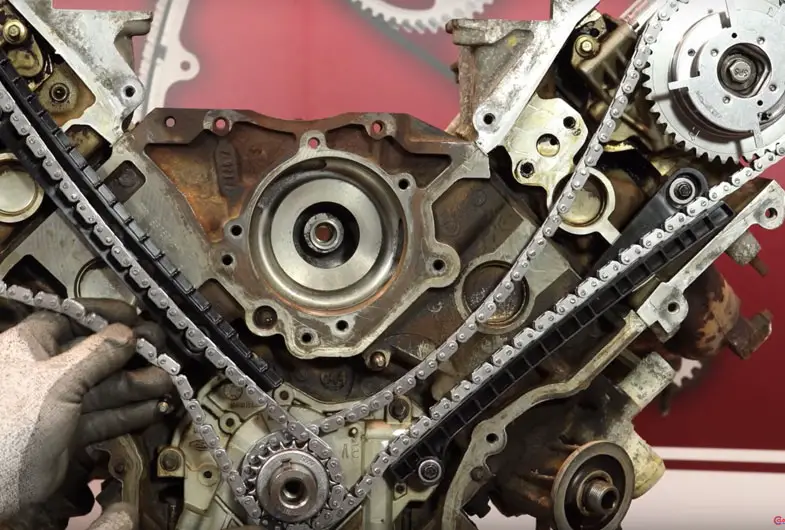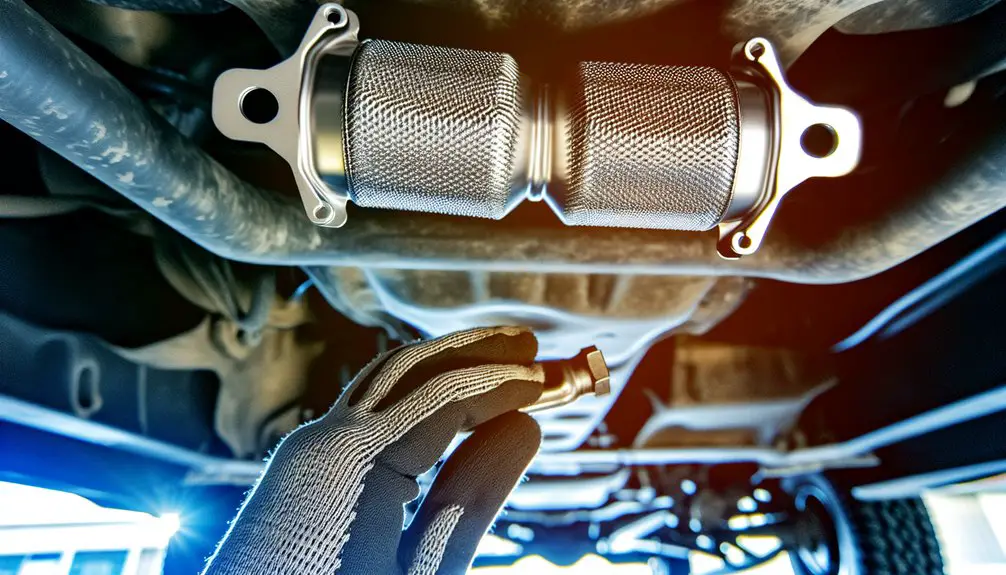Thinking about putting 35-inch tires on your F150 without a lift? You’re not alone.
Many truck enthusiasts wonder if it’s possible. Upgrading to 35-inch tires can enhance your truck’s look and performance. But, can you do it without lifting your F150? The answer is yes, but it’s not as simple as swapping tires. It involves understanding wheel well space, tire clearance, and potential modifications.
This blog will guide you through the process. You’ll learn about the benefits and challenges of running 35s on a stock F150. We’ll discuss the adjustments needed and help you decide if this upgrade is right for you. Ready to dive in? Let’s explore the world of 35-inch tires on a no-lift F150.

Credit: www.f150gen14.com
Introduction To F150 On 35s
The Ford F150 is a favorite among truck enthusiasts. It combines rugged durability with modern features. But, some owners look for more. They want bigger tires. That’s where the F150 on 35s comes in. These larger tires offer better off-road capabilities. And, the best part? No lift is needed. This combination is perfect for many truck owners.
Why Choose 35s?
35-inch tires provide several benefits. They enhance the truck’s ground clearance. This is crucial for off-road adventures. 35s also improve traction on rough terrains. The larger tires look impressive. They give the truck a more aggressive stance. They also offer better stability, especially on uneven roads. Simply put, 35s give your F150 a new level of performance.
Benefits Of No Lift
Not lifting your truck has its perks. First, it saves money. Lift kits can be expensive. With 35s, you don’t need them. Second, it maintains the truck’s factory ride quality. Lift kits can sometimes affect this. Third, it’s easier to install 35s without a lift. No need for complicated adjustments. Lastly, it keeps the truck’s center of gravity lower. This helps with stability. Especially during sharp turns or sudden stops.
Selecting The Right Tires
Choosing the right tires for your F150 on 35S without a lift is crucial. The right tires ensure safety, performance, and durability. They also affect ride comfort and fuel efficiency. This section will guide you through the process of selecting the best tires for your needs.
All-terrain Vs Mud-terrain
All-terrain tires are versatile and suitable for various surfaces. They perform well on highways and off-road trails. These tires offer good traction and a comfortable ride. Mud-terrain tires are designed for extreme off-road conditions. They have aggressive tread patterns for better grip in mud and dirt. Mud-terrain tires may be noisier and less comfortable on paved roads.
Tire Specifications
Check the tire size recommended for your F150. Ensure the tires fit without rubbing against the vehicle. Look at the load rating to match your truck’s weight capacity. Consider the speed rating for your driving habits. Higher speed ratings offer better handling but may wear out faster. Don’t forget the tread pattern, which affects traction and noise levels. Choose a pattern that suits your driving environment.
Wheel Compatibility
Choosing the right wheels for your F150 on 35S with no lift can be challenging. Understanding wheel compatibility is crucial to ensure a smooth ride. The right wheels will enhance your truck’s performance and appearance. Let’s dive into the key factors to consider.
Size Considerations
Size matters significantly for wheel compatibility. For an F150 on 35S without a lift, you need to select wheels that fit well without causing issues. The standard wheel size for these tires is typically between 17 to 20 inches in diameter. Ensure the wheel width matches the tire’s width to avoid any fitment problems. This ensures the tire sits properly on the wheel, providing stability and safety.
Offset And Backspacing
Offset and backspacing are crucial measurements for wheel compatibility. Offset refers to the distance from the wheel’s centerline to its mounting surface. A proper offset ensures the wheels sit correctly in the wheel wells. For an F150 on 35S tires, a positive offset is common. It helps position the wheels under the fenders properly.
Backspacing is the distance from the wheel’s mounting surface to the back edge of the wheel. Proper backspacing ensures the wheels clear the suspension and brake components. Too much backspacing can cause the wheels to rub against these parts. Too little can make the wheels stick out too far, causing handling issues.
Understanding these factors helps you make the right choice for your F150. Always check the specifications to ensure a perfect fit.

Credit: www.f150forum.com
Installation Process
Installing 35-inch tires on your F150 without a lift kit can be a rewarding project. It enhances the truck’s look and performance. Follow this guide for a smooth installation process.
Tools Needed
- Jack and jack stands
- Socket set
- Tire iron
- Torque wrench
- Measuring tape
- Trim removal tools
- Safety gloves and goggles
Step-by-step Guide
- Prepare Your Workspace
- Lift the Truck
- Remove Existing Tires
- Trim the Wheel Wells
- Install the New Tires
- Lower the Truck
- Final Adjustments
Park your F150 on a flat surface. Engage the parking brake. Gather all necessary tools.
Use the jack to lift the truck. Place jack stands under the frame for safety.
Use the tire iron to loosen the lug nuts. Remove the tires and set them aside.
Measure the wheel wells. Use trim removal tools to cut any excess material. This step ensures the new tires fit without rubbing.
Place the 35-inch tires onto the wheel hubs. Hand-tighten the lug nuts.
Carefully lower the truck using the jack. Once lowered, use a torque wrench to tighten the lug nuts to the manufacturer’s specifications.
Double-check the tire clearance. Ensure there is no rubbing when turning the wheel.
Congratulations! You have installed 35-inch tires on your F150 without a lift kit. Enjoy your new ride!
Performance Enhancements
Driving an F150 on 35S without a lift can be a thrilling experience. Enhancing performance ensures that you get the most out of your truck. This includes handling and off-road capabilities. Let’s explore these improvements in detail.
Handling Improvements
Upgrading to 35S tires can significantly improve the F150’s handling. The wider tires offer better grip on the road. This leads to smoother and more controlled driving. Enhanced handling boosts confidence behind the wheel. It makes daily driving safer and more enjoyable.
Off-road Capabilities
With 35S tires, your F150 becomes an off-road beast. The larger tires provide more traction on rough terrains. This makes driving on trails and rocky paths easier. You’ll notice better stability and control on challenging surfaces. These enhancements open up new adventure possibilities.
Maintenance Tips
Keeping your F150 on 35s without a lift in top shape is crucial. Regular maintenance ensures a smooth ride and extends the life of your vehicle. Here are some essential tips to keep your truck running optimally.
Tire Rotation
Tire rotation is vital for even tire wear. It helps maintain balance and traction. Rotate your tires every 5,000 to 7,000 miles. This simple task enhances tire lifespan and performance. It also ensures a safer ride.
Alignment Checks
Proper alignment is key for your F150. Misalignment can cause uneven tire wear. It also affects handling and fuel efficiency. Check your alignment at least once a year. If you notice uneven tire wear or pulling to one side, get an alignment check.
Common Challenges
Driving a Ford F150 with 35-inch tires without a lift can be thrilling. Yet, it also brings some common challenges. Understanding these issues can help you tackle them with ease.
Clearance Issues
One of the main challenges is clearance issues. Larger tires can rub against the fenders or other parts of the truck. This can happen during sharp turns or when driving over rough terrain.
Here’s a simple table to show common areas where clearance issues occur:
| Area | Cause |
|---|---|
| Front Fenders | Sharp Turns |
| Rear Fenders | Heavy Loads |
| Wheel Wells | Off-Road Driving |
To minimize rubbing, you can make small modifications. Trimming the fenders or adjusting the wheel alignment often helps. Always check the clearance after making any adjustments.
Suspension Wear
Another challenge is increased suspension wear. Larger tires put more strain on the suspension system. This can lead to parts wearing out faster.
Here are some common symptoms of suspension wear:
- Uneven tire wear
- Vibrations while driving
- Excessive bouncing
Regular maintenance is key to managing suspension wear. Check the shock absorbers and struts regularly. Replace any worn-out parts promptly to maintain a smooth ride.
Driving a Ford F150 with 35s without a lift can be challenging. Yet, knowing these common issues and how to address them can make the experience more enjoyable.
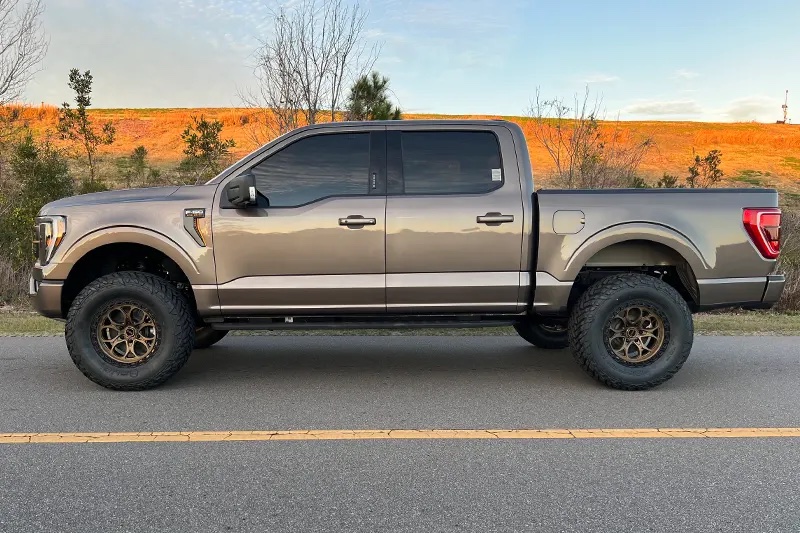
Credit: www.f150gen14.com
Real-world Experiences
Driving an F150 on 35S without a lift brings a unique thrill. Many users share their real-world experiences, highlighting both benefits and challenges. Let’s dive into what they have to say.
User Testimonials
Real users have a lot to say about their F150 experiences on 35S without a lift. Here are some of their testimonials:
- John D.: “The ride is smooth and the handling is great. I love the aggressive look without the added height.”
- Sarah K.: “No lift means I can still park in my garage. The 35S tires offer excellent traction on off-road trails.”
- Mike T.: “I was worried about performance, but it’s fantastic. My F150 feels powerful and stable.”
Expert Reviews
Experts have also weighed in on the F150 on 35S without a lift. Here are some key insights from professionals:
| Expert | Review |
|---|---|
| Auto Magazine | The F150 on 35S offers a great balance of style and performance. The lack of lift keeps it practical for daily use. |
| Truck Enthusiast | Even without a lift, the F150 handles tough terrains well. The 35S tires provide excellent grip and stability. |
| Off-Road Expert | For those who want off-road capabilities without sacrificing daily comfort, this setup is ideal. It maintains a lower center of gravity. |
These real-world experiences and expert reviews show the versatility and appeal of the F150 on 35S without a lift.
Frequently Asked Questions
What Are The Benefits Of Using 35-inch Tires On An F150?
35-inch tires improve off-road capability, ground clearance, and provide a more aggressive look.
Do I Need A Lift Kit For 35-inch Tires On My F150?
No, you can fit 35-inch tires on an F150 without a lift. But, some modifications may be needed.
How Does Tire Size Affect Fuel Economy On An F150?
Larger tires can decrease fuel efficiency due to added weight and increased rolling resistance.
Will 35-inch Tires Affect My F150’s Speedometer Accuracy?
Yes, larger tires can cause the speedometer to read slower than your actual speed.
Can 35-inch Tires Cause Rubbing On My F150?
Yes, 35-inch tires may rub the fenders or suspension components, especially during turns or over bumps.
How Do 35-inch Tires Impact The Driving Experience Of An F150?
They offer better off-road performance but may affect handling, ride comfort, and fuel efficiency on pavement.
Conclusion
Choosing to equip your F150 with 35-inch tires without a lift offers benefits. You maintain factory ride quality and improve off-road capability. The truck looks tougher and performs well on rugged terrains. Always ensure proper alignment and check for any necessary adjustments.
Safety should be a priority. This setup is ideal for those seeking enhanced performance without drastic modifications. Enjoy the balance of style and function with your F150 on 35s.
- Ford F150 Shaking When Idling - December 23, 2024
- Ford F150 Timing Chain Replacement - December 23, 2024
- How Many Catalytic Converters Are In A Ford F150 - December 23, 2024

